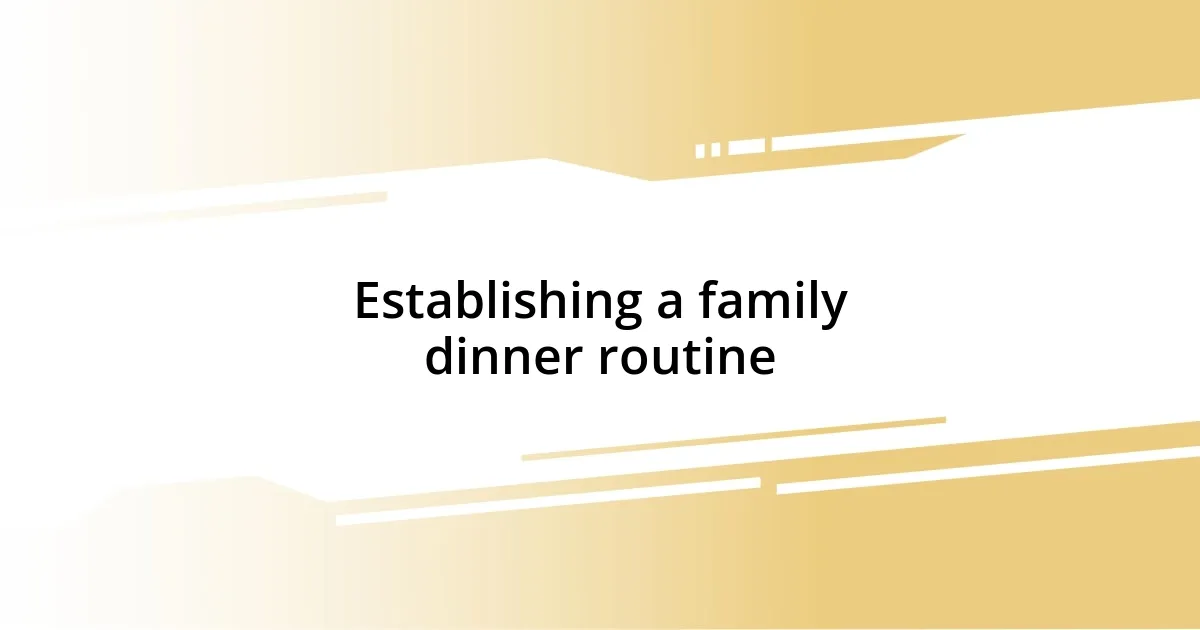Key takeaways:
- Establishing a consistent family dinner routine fosters bonding and allows for meaningful conversations about each family member’s experiences and feelings.
- Involving all family members in meal planning and preparation enhances participation and creates a sense of ownership, turning cooking into a collaborative and fun activity.
- Creating a warm and inviting atmosphere, through details like music and themed dinners, transforms mealtime into a celebration of togetherness and joy.
- Celebrating milestones and sharing highlights from the week during dinners strengthens family bonds and enriches the overall dining experience.

Establishing a family dinner routine
Creating a family dinner routine isn’t just about the food; it’s about the moments you share around the table. I remember the first time we made it a point to gather every Friday night. The anticipation grew each week as we planned what we would cook together, turning the meal preparation into a bonding experience filled with laughter and even the occasional kitchen mishap.
Have you ever noticed how the act of sharing a meal can spark some of the most meaningful conversations? I found that our dinner table became a safe space where my kids felt comfortable sharing their highs and lows from the week. It was during those meals that I learned about their dreams, worries, and even the small victories in their lives—moments that I cherish deeply.
As I reflect on our routine, it’s clear that consistency plays a crucial role. Establishing a set day and time made it easy for everyone to keep it on their radar. It’s funny how something as simple as a weekly dinner can become the highlight of our week—what’s one tradition that could bring your family closer together?

Choosing the right day
Choosing the right day for our family dinner tradition was a bit of trial and error. I remember trying different options throughout the week, but it was our Friday evenings that ultimately won everyone over. Fridays felt like the perfect transition into the weekend—a time to unwind, reflect on the week, and just enjoy being together.
When considering which day to establish your family dinner, think about these factors:
- Weekday distractions: Activities, work schedules, and other commitments can interfere. Find a day with the fewest outside obligations.
- Family availability: Check in with each member about their schedules. It’s essential to choose a day that works for everyone to foster participation.
- Tradition compatibility: Consider existing family traditions or events. You want your dinner to complement, not compete with, them.
- Meal prep dynamics: Some days might be better for cooking as a family, like weekends when there’s more time to experiment in the kitchen.
Personally, Friday nights became our sacred time. I’ve learned that this weekly commitment has made us not only closer as a family, but it also provided a slice of routine in the hustle of modern life—something I truly cherish.

Involving family members
Involving family members in the dinner planning process has been a game-changer for us. Early on, I started asking for everyone’s input on meal choices, and it was amazing to see how much more invested they became. When my youngest suggested tacos one week, he suddenly felt like the hero of the evening, and that sense of ownership was palpable. It turned our cooking sessions into a lively, collaborative effort, where each of us shared our taste preferences and even launched into playful debates about the right way to set the table.
I’ve learned that assigning roles can enhance the dinner experience. One week, I made my oldest responsible for dessert, while my partner took charge of the main course. This division of tasks not only made preparing the dinner smoother, but it also sparked excitement and friendly competition. We often joked about who would whip up the best dish, turning our kitchen into a joyful battlefield instead of a chore-filled zone. Introducing this kind of playful responsibility fosters a sense of teamwork that glues us closer together.
Sharing the cooking responsibilities also opened the door to teaching moments. I fondly recall a time when my daughter showed off her knife skills and challenged me to chop vegetables faster. It became a delightful dance of laughter and friendly teasing, where we both learned something new. This kind of involvement not only enriches the meal but strengthens our bonds, turning a simple dinner into an unforgettable memory of togetherness.
| Involvement Type | Description |
|---|---|
| Meal Planning | Encouraging everyone to suggest dishes boosts interest and excitement. |
| Role Assignment | Distributing cooking tasks enhances teamwork and brings a sense of competition. |
| Teaching Moments | Engaging in culinary skills together fosters laughter and lasting memories. |

Planning the menu together
Planning the menu together can feel like embarking on a little culinary adventure. I remember one evening when we gathered in the kitchen, armed with sticky notes and a big piece of paper. Each family member wrote down their favorite dishes and we ended up in a playful debate about the merits of spaghetti versus homemade pizza. It took a bit of back-and-forth, but the laughter and enthusiasm that came out of it were invaluable; it turned menu planning into a joyful brainstorming session instead of a chore.
I’ve noticed that incorporating seasonal ingredients can also ignite creativity in our menu planning. I’ll never forget last fall when we decided to have a pumpkin-themed dinner. It sparked so many ideas! My youngest got super excited about trying a pumpkin soup recipe together, while my partner and I looked up how to make pumpkin bread. This kind of collaboration made the dinner feel extra special, as we were not just feeding our bodies but also feeding our imaginations.
One thing I’ve learned is that there’s a certain magic in deciding the menu as a family. It gives everyone a voice and builds anticipation for the meal. Do you ever find that your kids get more enthusiastic when they’re part of the creation process? I’ve seen firsthand how our little eating clan becomes more eager to enjoy the meal they helped choose and prepare. Sharing the responsibility has not only enhanced our menu but has also fortified our family connection—each dinner becomes a manifestation of our collective creativity and love.

Creating a warm atmosphere
Creating a warm atmosphere at family dinners is all about the little details that make everyone feel included and comfortable. I remember lighting candles one evening as we gathered at the table. The soft glow turned our ordinary dining room into a cozy refuge, inviting connection and conversation. It’s a small touch, but it made us feel like we were sharing a special occasion, no matter what was on the menu.
Music can significantly enhance the mood, too. I often pull together a playlist that reflects our family’s favorites—everything from old-school classics to the latest hits. One evening, as we sat down to enjoy our meal, I played a song my daughter had been obsessed with. She started singing along, and soon everyone joined in, laughing at off-key harmonies. These moments of spontaneity not only lighten the atmosphere but also create cherished memories that linger long after the plates are cleared.
Another aspect I’ve found crucial is setting the scene. We sometimes switch things up by having themed dinners—like a “taco night” complete with decorations—and it quickly transforms our dining experience. Imagining what it must feel like for my kids to anticipate a night filled with fun rather than just another home-cooked meal brings me joy. Have you ever noticed how even the simplest meals become enchanting when paired with enthusiasm? That’s the magic of creating an atmosphere that’s warm and inviting; it turns the act of eating into a celebration of togetherness.

Tips for successful dinners
Offering a variety of dishes is a great way to accommodate different tastes. I remember preparing a buffet-style dinner for my family once, with everything from grilled veggies to pasta salad. It was lovely to see everyone filling their plates with what they loved; there was no pressure to eat something they didn’t want. It also sparked wonderful conversations as we swapped food recommendations and shared our favorites.
One tip that has transformed our dinners is incorporating a “highlight of the week” moment into our routine. At one dinner, my youngest shared a story about a school project, and the delight in her eyes made everyone lean in closer. This practice encourages us to engage with each other’s lives more deeply and fosters a supportive environment. Have you considered what stories or experiences might bring your family closer during dinner?
Time management can really make or break a dinner experience. I learned this the hard way when I tried to make everything from scratch on a busy weeknight. Now, I plan ahead by preparing some dishes in advance, turning the cooking process into a fun shared activity earlier in the day. This way, when dinnertime arrives, I can relax and truly enjoy the meal with my loved ones instead of scrambling around in the kitchen. How do you think organizing your dinner prep ahead of time could change your family meals?

Celebrating milestones and memories
Celebrating milestones during our family dinners has become a cherished tradition. One year, we marked my daughter’s graduation with a special dinner. I vividly remember her beaming smile as we toasted to her future, surrounded by laughter and stories. It’s incredible how sharing such moments turns mere meals into unforgettable celebrations that bind us together.
I also make it a point to celebrate the little victories, like my son’s soccer goals or my partner’s project completion. Those seemingly small achievements deserve acknowledgment. When we gather around the table, I often ask everyone to share their proudest moment for that week. Watching their eyes light up as they reminisce fills the room with warmth and encouragement. Isn’t it fascinating how acknowledging these moments can strengthen our family’s bond?
The memories we create during these dinners become part of our family’s narrative. I recall a particular night when we all laughed over an old, silly family story. As we shared a hearty meal, the essence of our shared history enveloped us, reminding us of our journey together. How often do you take time to reflect on your family’s stories over a meal? Embracing these traditions adds depth and meaning to our lives, transforming each dinner into a tapestry of memories that we can cherish for years to come.














